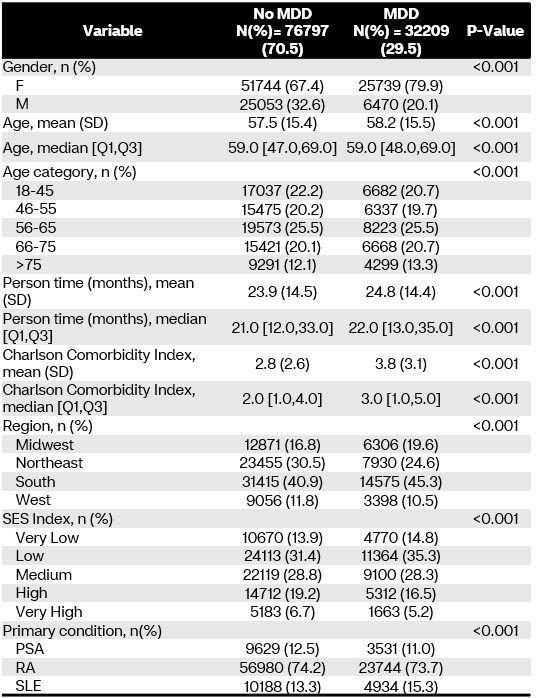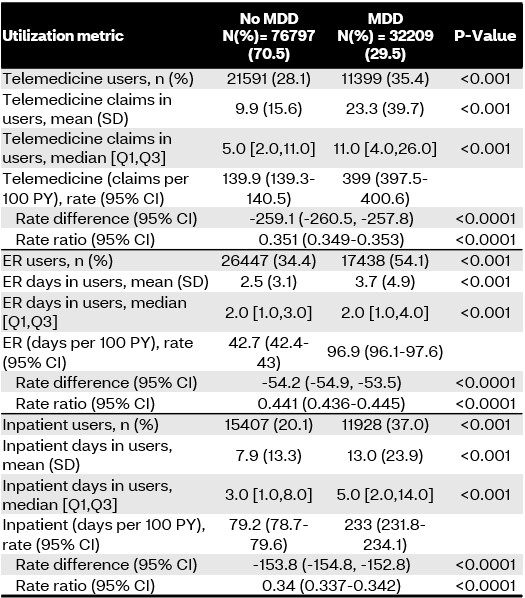Session Information
Session Type: Poster Session B
Session Time: 9:00AM-11:00AM
Background/Purpose: Patients with rheumatoid arthritis (RA), psoriatic arthritis (PsA) and systemic lupus erythematosus (SLE) have higher rates of psychiatric comorbidities, particularly depression and anxiety. Comorbid depression has been associated with increased disease activity in patients with rheumatic conditions. What isn’t known, is how comorbid depression impacts healthcare utilization in these patients. The objective of this study was to assess the impact of depression on healthcare utilization in patients with RA, PsA and SLE.
Methods: This cohort study included fully insured commercial or Medicare members of a large national health plan between 1/1/2018 and 1/1/2023. Members ≥ 18 years old were included if they had at least 2 visits for RA (ICD-10 code: M05 or M06), PsA (L40.5), or SLE (M32) during the study period. Members were excluded if they did not maintain continuous eligibility for 6 months before or after entrance into the study, had multiple conditions of interest, or had missing socioeconomic status (SES) data. Members were stratified by presence of a visit for depression and anxiety (MDD). Healthcare utilization metrics were examined as use of telemedicine, emergency department (ER), or inpatient services and were identified by place of service codes on medical claims. Telemedicine utilization included both medical and behavioral health visits. ER and inpatient claims were aggregated by day and are presented by days utilizing the service. Utilization rates were calculated based on total person years observed in each cohort and the sum of telemedicine claims. ER days and inpatient days are presented as claims or days per 100 person years observed. Rate differences and rate ratios (RR) were calculated with 95% confidence intervals (CI). Continuous variables were assessed utilizing t-tests; categorical variables were assessed with the Chi2 test. P-values < 0.05 are significant.
Results: Of the 109,006 members included, 32,209 (29.5%) had a visit for depression (MDD). Table 1 demonstrates significant differences in baseline demographics between disease states, with MDD members being older (mean age (standard deviation (SD)): 58.2 (15.5) vs. 57.5 (15.4) years; p< 0.001) and having more comorbidities at baseline (mean Charlson Comorbidity Index (SD): 3.8 (3.1) vs. 2.8 (2.6); p< 0.001). Table 2 demonstrates the differences in healthcare utilization between cohorts. Members in the MDD group had significantly higher telemedicine (RR [95% CI]: 2.85 [2.83 – 2.86]; p< 0.0001), ER (RR [95%CI]: 2.27 [2.25-2.29]; p< 0.0001), and inpatient (RR [95% CI]: 2.94 [2.92-2.97]; p< 0.0001) utilization.
Conclusion: Members diagnosed with RA, PsA, or SLE with visits for depression and anxiety utilized significantly more healthcare services than those that did not have depression. These findings highlight the importance of managing depression and anxiety when treating patients with RA, PsA and SLE.
To cite this abstract in AMA style:
Rutter W, Park J, Avalos-Reyes E, Liu C, Cavers W, Verbrugge D, Johnson K. Impact of Depression on Healthcare Utilization in Members with Underlying Rheumatoid Arthritis, Psoriatic Arthritis and Systemic Lupus Erythematosus [abstract]. Arthritis Rheumatol. 2023; 75 (suppl 9). https://acrabstracts.org/abstract/impact-of-depression-on-healthcare-utilization-in-members-with-underlying-rheumatoid-arthritis-psoriatic-arthritis-and-systemic-lupus-erythematosus/. Accessed .« Back to ACR Convergence 2023
ACR Meeting Abstracts - https://acrabstracts.org/abstract/impact-of-depression-on-healthcare-utilization-in-members-with-underlying-rheumatoid-arthritis-psoriatic-arthritis-and-systemic-lupus-erythematosus/


